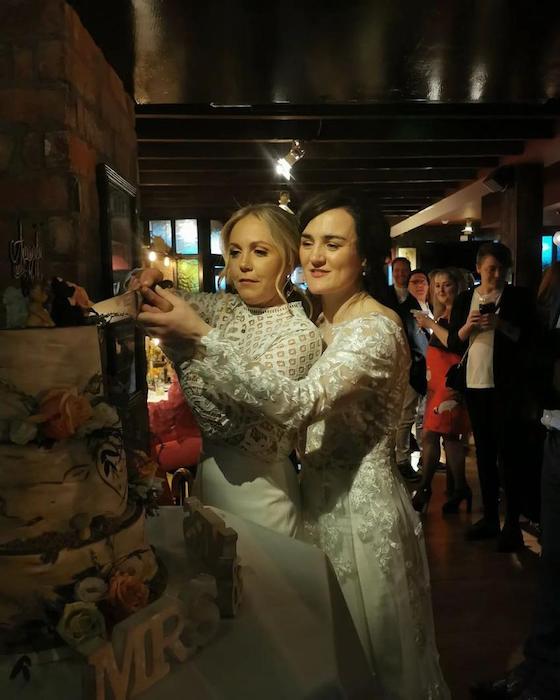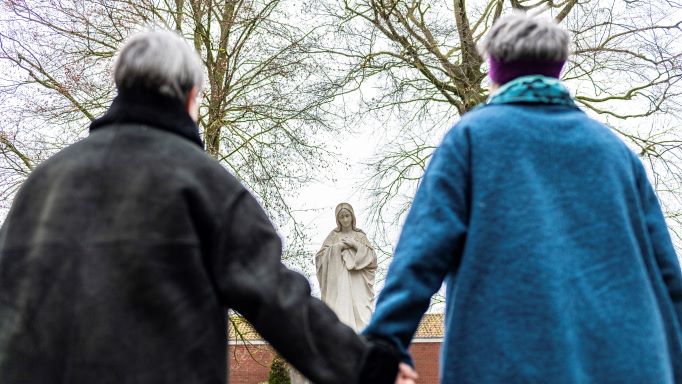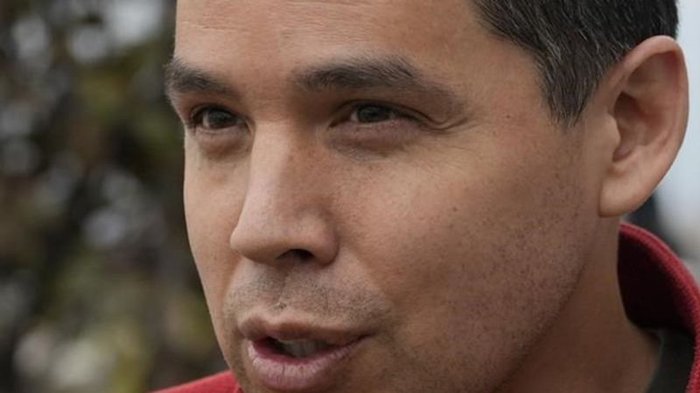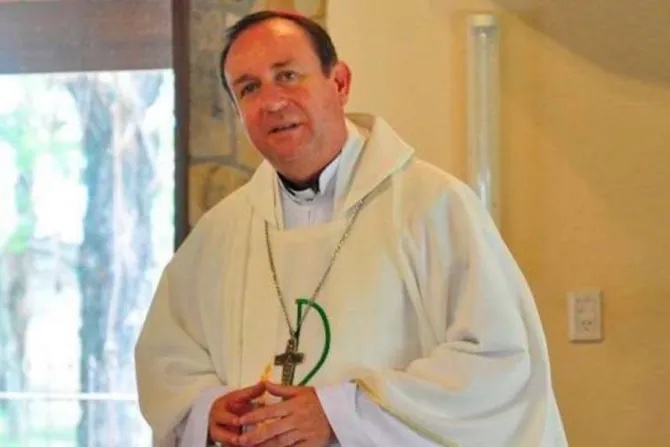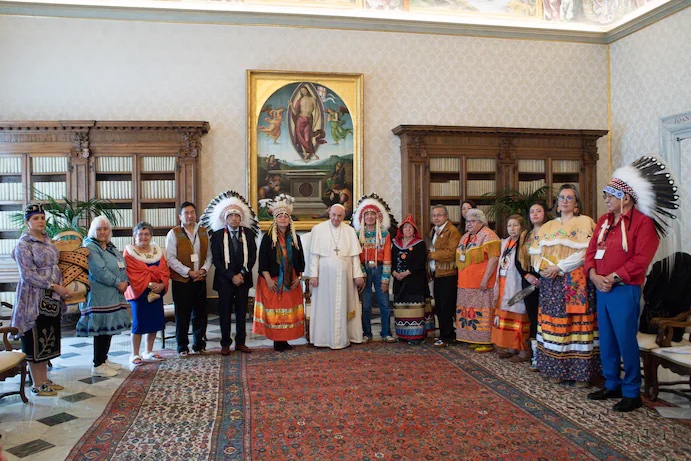
By Cory Bilyea
Pope Francis told a delegation of Indigenous, Métis, and Inuit people that he was sorry for some bad apples who ran the residential schools, but he fell short of apologizing on behalf of the church for the horrors that happened behind closed doors at these institutions.
“For the deplorable conduct of these members of the Catholic Church, I ask for God’s forgiveness and I want to say to you with all my heart, I am very sorry. And I join my brothers, Canadian bishops, in asking your pardon,” said Pope Francis.
The United Church, the Catholic Missionary Oblates of Mary Immaculate, the Anglican Church, and the Presbyterian Church all issued formal apologies between 1986 and 1994 for their participation in the residential school system.
On June 11, 2008, Prime Minister Stephen Harper apologized to former students of Indian Residential Schools on behalf of the Government of Canada.
Call to Action No. 58 of the Truth and Reconciliation Commission, released in June 2015, is still unfulfilled:
“We call upon the Pope to issue an apology to Survivors, their families, and communities for the Roman Catholic Church’s role in the spiritual, cultural, emotional, physical, and sexual abuse of First Nations, Inuit, and Métis children in Catholic-run residential schools. We call for that apology to be similar to the 2010 apology issued to Irish victims of abuse and to occur within one year of the issuing of this report and to be delivered by the Pope in Canada.”
Pope Francis held several meetings with the delegates. He listened to the stories of residential school survivors, elders, youth, and leaders, all speaking to him about the genocide of their people and the healing path forward.
The Pope said, “Over the past days, I’ve listened attentively to your testimonies. I have brought them to my thoughts and prayers, reflecting on the stories you told and the situations you described. I thank you for having opened your hearts to me and for expressing, by means of this visit, your desire for us to journey together.
“Listening to your voices, I was able to enter into and be deeply grieved by the stories of the suffering, hardship, discrimination, and various forms of abuse that some of you have experienced, particularly in the residential schools.
“It’s chilling to think of determined efforts to instill a sense of inferiority, to rob people of their cultural identity, to sever their roots, and to consider all the pertinent personal and social efforts that this continues to entail — unresolved traumas that have become intergenerational traumas.
“All this has made me feel two things very strongly — indignation and shame.”
At the end of his speech, the Pope told the delegation that he looked forward to coming to Canada to “better express to you my closeness,” indicating that he may make the pilgrimage to Turtle Island during the “Feast of St. Anne” in July.
Many Indigenous, Métis, and Inuit people want the Pope to apologize to them in person on Turtle Island. Given his age and the momentous undertaking that trip will entail, a firm timeline is yet to be established, but the plans are being made.
During a news conference after the meeting, the head of the Indigenous delegation, Chief Gerald Antoine, said that the apology was long overdue but an important “first step.”
“The next step is for the Holy Father to apologize to our family at their home,” Antoine said.
Natan Obed, president of Inuit Tapiriit Kanatami, a group representing more than 60,000 Inuit People on Turtle Island, agreed with Antoine, adding, “We have a heartfelt expression from the church that was delivered by Pope Francis in an empathetic and caring way. I was touched by the way in which he expressed his sorrow, and also the way in which he condemned the actions of the church.”
Obed said, “There is much more to do, and so an apology is a part of a larger picture.”
Reaction to the apology has been mixed, as anger, hurt, and sorrow still permeate survivors and relatives. Many say they do not accept this apology, nor do they believe the Pope’s sincerity.
This is an unfortunate reality of the residential school system. Not only did they take the language and the culture, but they also took away the ability to trust.
Saugeen Ojibway Nation (SON) member Ephraim Sandy said, “It saddens me, breaks my spirit. Empty words that mean nothing. Turn over the cultural items. The land. And all of the abusers to stand trial. No more words.”
There was no mention from the Pope about the many cultural artifacts kept in the Vatican or if these items will be returned to the People, nor did he address the land inquiries, the church’s financial obligations, or the request to rescind the Doctrine of Discovery.
“At the end of the day, we are left to heal our wounds and traumas and keep rebuilding our lives every time this issue is raised,” SON member Johnston Prin said in a social media response. “Land back and housing and compensation for all might help to ease some of the burdens we’ve carried over the generations. Our kids are in pain and use painkillers to ease the suffering. It’s heartbreaking.”
Prime Minister Justin Trudeau also weighed in on the apology, saying, “This apology would not have happened without the long advocacy of survivors who journeyed to tell their truths directly to the institution responsible and recounted and re-lived their painful memories.”
“It took a tremendous amount of bravery and determination,” Trudeau added, “Today’s apology is a step forward in acknowledging the truth of our past in order to right historical wrongs, but there’s still work to be done.”
Indigenous journalist Brandi Morin travelled to Rome to cover the week-long event.
“I’m stunned by (The Pope’s) apology. I know many delegates who came here and other survivors who long prayed for an apology are feeling a sense of justice from this action,” Morin said in a social media post.
For more than 150 years, First Nations, Inuit, and Métis Nation children were taken from their families and communities to attend schools often located far from their homes. More than 150,000 children attended Indian Residential Schools. Many never returned.
The first church-run Indian Residential School was opened in 1831. By the 1880s, the federal government had adopted an official policy of funding residential schools across Canada. The explicit intent was to separate these children from their families and cultures. In 1920, the Indian Act made attendance at Indian Residential Schools compulsory for Treaty-status children between the ages of seven and 15.
The last federally run Indian residential school closed in 1996.
There is still a lot of work to be done on the path towards healing and reconciliation, with truth being at the forefront of this vast and painful undertaking.
Complete Article ↪HERE↩!
